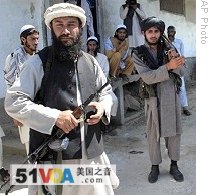Washington
04 May 2009
 |
| Taliban militants hold weapons outside mosque where tribal elders and Taliban met in Daggar, Buner's main town, 23 Apr 2009 |
After the government and the Taliban signed an accord that mandated the establishment of the Islamic legal code in the Swat Valley, the Pakistani Taliban started pushing out of the area into neighboring districts. At the government's behest, the army started pushing back.
Pakistani newspaper columnist and National Assembly member Ayaz Amir says the Taliban blundered.
"There was a certain kind of a tipping point after the so-called Swat Accord. It was when the Swat Taliban were seen to be overreaching themselves," said Ayaz Amir. "And instead of resting on their laurels, they were trying to extend their influence. And one or two speeches by Maulana Sufi Mohammad that democracy is outside Islam, the courts are outside the pale of Islam - that, and the advance of the Taliban into the district of Buner."
 |
| Pakistani forces park their tanks in Lal Qila Maidan after taking over the area from Taliban in Lower Dir, 01 May 2009 |
"There has been a complete change in the attitude of the entire nation towards these people," said General Orakzai. "And the Pakistani nation stands united in defeating their designs because nobody in Pakistan would like these people to take over and establish their version of Islam or impose their version of Islam on the people. It's quite a sudden change in the mood of the nation."
But other analysts are not so sure.
Christine Fair of the RAND Corporation has just returned from Pakistan, where she conducted a public opinion survey. She says the data is still being analyzed and that the results will not be released for several weeks. But, she says, the Pakistani public appears to be still deeply conflicted about what is going on and how to deal with it.
"You see a lot of ambivalence," said Christine Fair. "You still see a lot of support for peace deals and also high levels, not a majority, but the country is really divided on whether military solutions or peace deals are the most appropriate way to handle the threat. So what I can see is that the country is deeply divided."
The United States has been urging Islamabad to do more to root out militant sanctuaries in Pakistan's tribal areas, which have been used as launching pads for attacks into Afghanistan. But aggressively taking on the Taliban and its allies has been widely seen in Pakistan as caving in to U.S. pressure and thus politically unpalatable for the Pakistani government.
U.S. Predator drone air strikes on alleged militant sanctuaries in Pakistan have sparked resentment because of civilian casualties. Successive Pakistani governments have instead pursued political peace deals with Islamic extremists and their tribal allies, even in the face of suicide attacks in Pakistan itself.
National Assembly member Ayaz Amir says Pakistan is caught between two sides.
"What is threatening the fabric of the Pakistani state are two forces - the Taliban on one side and American desperation in Afghanistan on the other," he said.
Analyst Christine Fair says she recognizes the resentment the drone attacks cause, but still puzzles how the Pakistani public blames the United States for the militant problem because the government has sometimes used militant groups to foster its own agenda.
"I'm a little bit confused as to how it is this narrative persists," she said. "This is not a problem that the United States has made. This is very much coming out of Pakistan's incessant and unrelenting interest in maintaining some militant groups as strategic assets, while trying to declare other militants to be an enemy of the state. So you can imagine that it's very difficult to comprehensively fight these militants when some of these militants are protected assets."
Ayaz Amir says the public mood in Pakistan will hinge on whether the army can produce a different outcome than in its past confrontations with the militants.
"It remains an open question whether the army is prepared for this and whether it is able to sustain it," said Amir. "If it's different this time, well and good. If it's able to sustain it, well and good. But if this offensive also runs into opposition and the army's momentum and enthusiasm flag, it will mean more demoralization here and the Taliban more emboldened."
The United States is working on a new aid package for Pakistan to boost the unconventional warfare capabilities of the Pakistani military, which has been oriented toward conventional warfare, but has little expertise in counterinsurgency.